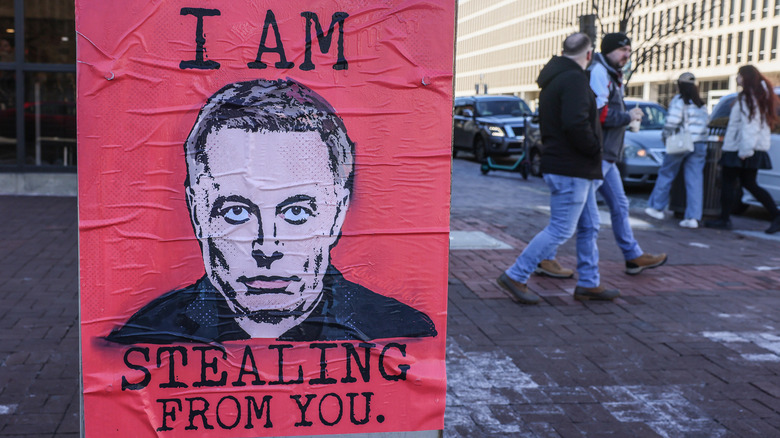Musk's New Plan To Get His $56 Billion: Change The Law
Tesla CEO Elon Musk has been busy dismantling the federal government to enrich himself and his billionaire buddies, but if you thought he'd be too distracted to also continue going after his $56 billion pay package, you couldn't been more mistaken. This time around, though, it appears Musk have a new strategy: Simply want to change the law. A law firm representing both Musk and Tesla has drafted a bill to change Delaware General Corporation Law to allow Musk to get his billions, CNBC reports.
The law firm, Richards, Layton & Finger, confirmed its involvement, with the president of RLF telling CNBC, "Statutory changes are necessary to restore the core principles that have been the hallmark of Delaware for over a century and ensure that Delaware remains the preeminent jurisdiction for incorporation." A spokesperson for the firm, however, denied writing the proposed legislation on behalf of a specific client.
The bill has, however, already been introduced in the Delaware General Assembly. As Boston College corporate law professor Brian JM Quinn told CNBC, though, it wasn't introduced the way similar bills have in the past. Typically, proposed legislation was done through the Delaware State Bar Association's Corporation Law Council, but according to Quinn, the council wasn't even consulted before RLF introduced the bill in the Assembly.
What the proposed law would do
If the governor were to sign the bill into law, Musk would no longer be considered to be a controller of Tesla, likely paving the way for the richest man in the world to add tens of billions to his net worth:
The pay package Tesla granted to Musk in 2018 was the largest CEO compensation plan in public corporate history, with a potential $55.8 billion maximum value, but the Delaware Court of Chancery in early 2024 ordered it to be rescinded.
In her ruling, Chancellor Kathaleen McCormick wrote that the pay plan was inappropriately set by Tesla's board, which was controlled by Musk, and that it was approved by shareholders who were misled by Tesla's proxy materials before they were asked to vote on it.
Under the proposed legislation, Musk might no longer be considered a "controller" of Tesla, Quinn said. That's because Musk does not currently hold one-third of Tesla's voting securities, which would be the requirement under the proposed legislation. Those transactions range from going-private deals, to mergers and acquisitions, to board and executive compensation decisions.
"The real role of corporate law is to protect minority investors," Quinn said. "With this bill, the legislature is saying, 'Now, you know what? Protect them less.'"
The proposed legislation would also limit the kinds of documents that minority stakeholders are able to obtain through "books and records" inspection requests, Quinn said. Those stakeholders would be limited to formal items such as a certificate of incorporation or minutes of stockholder meetings but they'd lose access to informal communications such as emails or other messages between board members and executives, Quinn said.
The legislation will still have to pass both chambers in the state and be signed by the governor to go into effect, but it sounds like Gov. Matt Meyer is at least open to it. In a statement, Secretary of State Charuni Patibanda-Sanchez said Meyer "looks forward to viewing a final product that meets the evolving needs of all our stakeholders."
Elon Musk's pay package
Musk's controversial pay package dates back to 2018 when he struck a deal with Tesla's board to take no salary from the automaker he bought into and be awarded stock options based on the company's revenue and market cap. At the time, Musk was only worth a mere $20 billion, and the goal was to get Tesla's market cap past $650 billion. It sounded like a ridiculous plan at the time, considering Tesla's annual sales, general lack of profits and $59-ish billion valuation when the package was announced, but Wall Street is full of credulous rubes who bought Musk's obvious lies and exaggerations, driving the stock well past that figure. Currently, Tesla's market cap sits just north of $1 trillion.
In 2022, investors sued to stop Musk from receiving the $56 billion, and in January 2024, the Delaware judge overseeing the lawsuit ruled against Musk, saying at the time that Musk had negotiated the agreement with a board that wasn't truly independent and hadn't taken the interest of the shareholders into account when agreeing to make their buddy unfathomably rich.
Later that year, Tesla asked shareholders to vote to approve the package and also appealed the ruling, which the judge then rejected again back in December. That was, of course, before Trump was inaugurated and allowed Musk to worm his way into controlling the federal government. Now, with more money than anyone in the history of the world has ever possessed and Trump's blessing to do whatever he wants, there are a lot fewer guardrails keeping him from exerting undue influence over state governments, as well.
